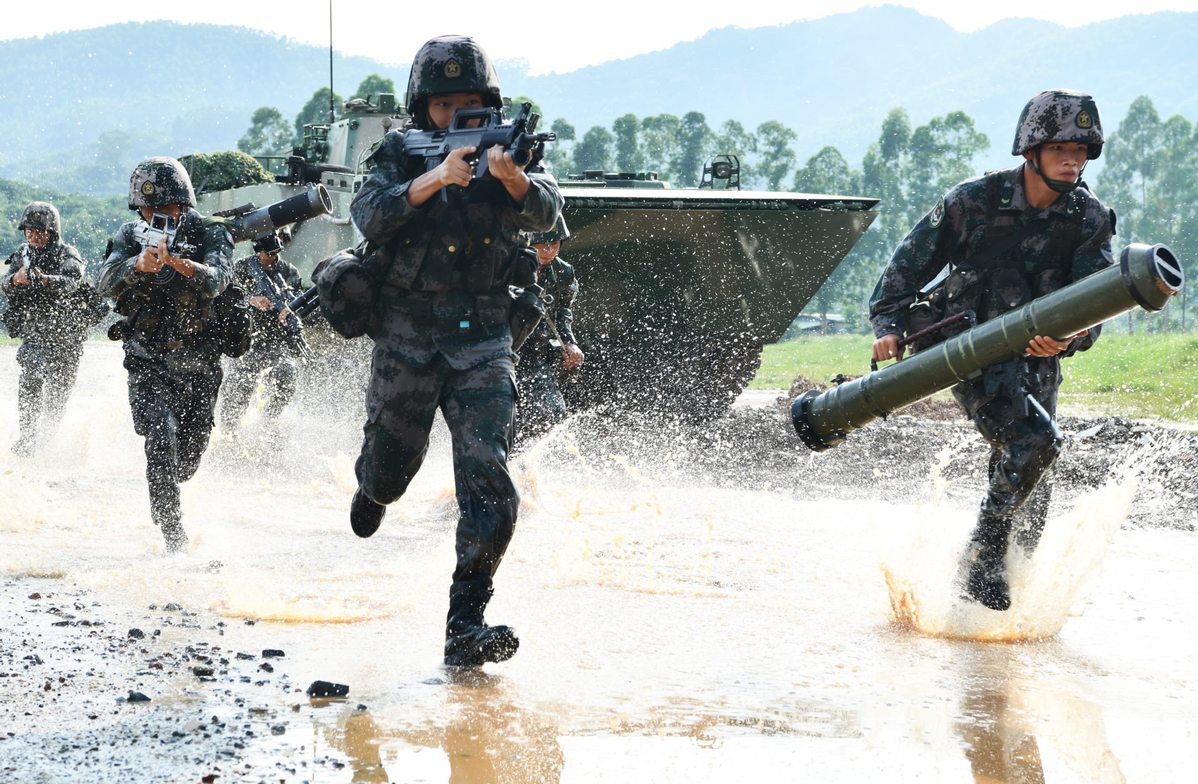Military honing its capability to triumph in battle


During a joint battle drill taking place during summer in a coastal area of Guangdong province, soldiers from the sixth company of the 74th Army Group of the People's Liberation Army faced a strong opposing force made up of a joint amphibious brigade.
They were far outnumbered, with a ratio about 2 to 15, and their weapons were also outmatched, but they firmly defended the line to stop the opponents from making a landing. Repelled, the amphibious brigade called for air support. Two fighter jets were sent, attacking and causing huge losses to the Sixth Company.
Just as the line was about to be breached, a small shock team of the Sixth Company launched a sudden attack on the opposition force's command vehicle, "killing" all commanders and successfully completing their defense mission.
The company is known as the "Hard-boned Sixth Company", an honorary title bestowed by the Ministry of National Defense in the 1960s for the number of war heroes it produced in its 80-plus-year history who fought bravely and made the ultimate sacrifice.
Today in a time of peace, the company still lives by a tough combat spirit and trains in harsh conditions to win battles. "Our goal is to always aim at actual combat and advance to a higher level," said the company's commander, Captain Zhao Song.
In January, the company wrote a letter to President Xi Jinping, reporting on their work and expressing their firm determination to win. Xi later wrote in reply, encouraging all officers and soldiers to keep in mind the goal of strengthening the army, carrying forward the "hard-boned spirit" and building a stronger company.
Reinforcing combat readiness has always been a priority continuously stressed by Xi, who is also general secretary of the Communist Party of China Central Committee and chairman of the Central Military Commission. Over the past few years, he has urged the military many times to keep honing combat capabilities and fostering a war-winning mentality.
In October 2017 during the 19th CPC National Congress, he set a goal that the Chinese military will become a modernized power by 2035 and a world-class force by 2050. Under his leadership, the military has beefed up efforts to achieve the goals by increasing its training intensity, pushing forward reforms and speeding up the development of modernized equipment and weapons to be more prepared for today's informatized warfare.
On July 23, in the run-up to China's Army Day on Saturday, Xi visited the Aviation University of the Air Force in Jilin province to inspect pilots' training courses, teaching facilities and the training of unmanned aerial vehicle operators.
Xi said that with the emergence of a large number of various types of drones, unmanned operations are bringing profound changes to warfare. He stressed the university should strengthen research into unmanned combat, step up training in real combat conditions and aim to foster drone professionals who can take command in such warfare.
He also highlighted the close connection between military education and actual battlefields, urging the university to promote studies on modern air warfare and focus on teaching for actual combat and winning wars.
Such remarks were also echoed at a plenary meeting in May, when Xi met with the military delegation during the annual session of the National People's Congress, China's top legislature. Xi asked the military to scale up combat training, respond promptly and effectively to all sorts of complex situations and firmly safeguard national sovereignty, security and development interests.
During inspections of local military units in previous years, Xi has reiterated the necessity to optimize troop structure, coordinate various units to forge strong systematic joint-operation prowess and promote advancement of scientific and technological innovation that helps accelerate modernization work.
To put Xi's words into practice, military units nationwide have explored new tactics and established higher standards in training. The sixth company, for example, required all soldiers to master not only their own area of expertise but also multiple specializations in field operations. Now at least 85 percent of all company officers and soldiers are proficient in more than two major areas.
Current exercises and drills closely simulate actual combat, requiring troops to strike random targets with no rehearsal in unfamiliar areas and unexpected situations. After every drill, the Sixth Company assesses their performance and researches new tactics to fix the problems they encountered during practice.
The Sixth Company's increasing effort to refine operational performance is typical of the Chinese military's ongoing reforms in recent years that aim to boost actual combat capabilities and joint operational capacity, officials said.
Starting in late 2015, China's armed forces have undergone massive reforms in a bid to make the military leaner but stronger and more efficient. The white paper "China's National Defense in the New Era", published in July 2019, said China had mended its military policy system, adjusted the structure of combat troops and reduced troop numbers by 300,000.
























